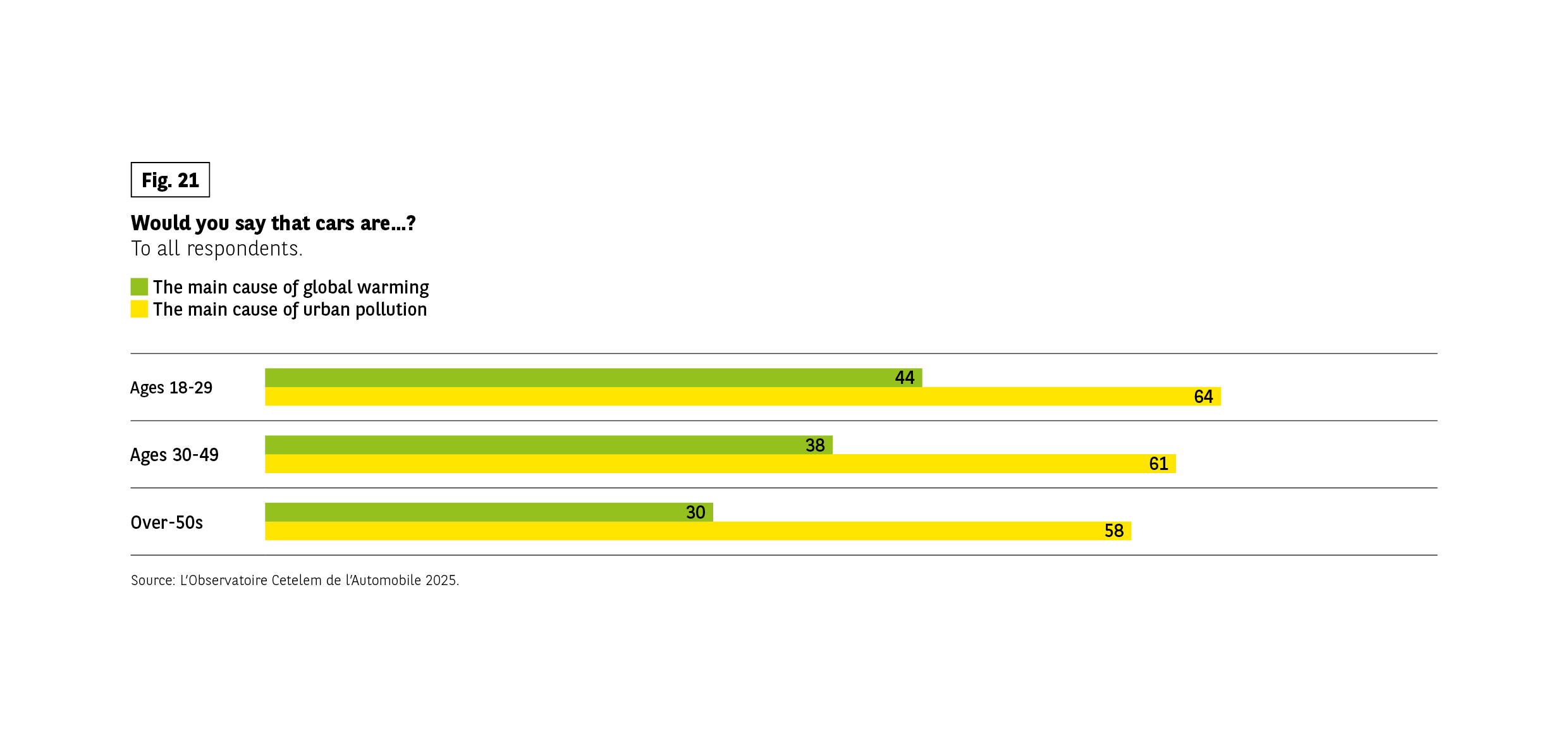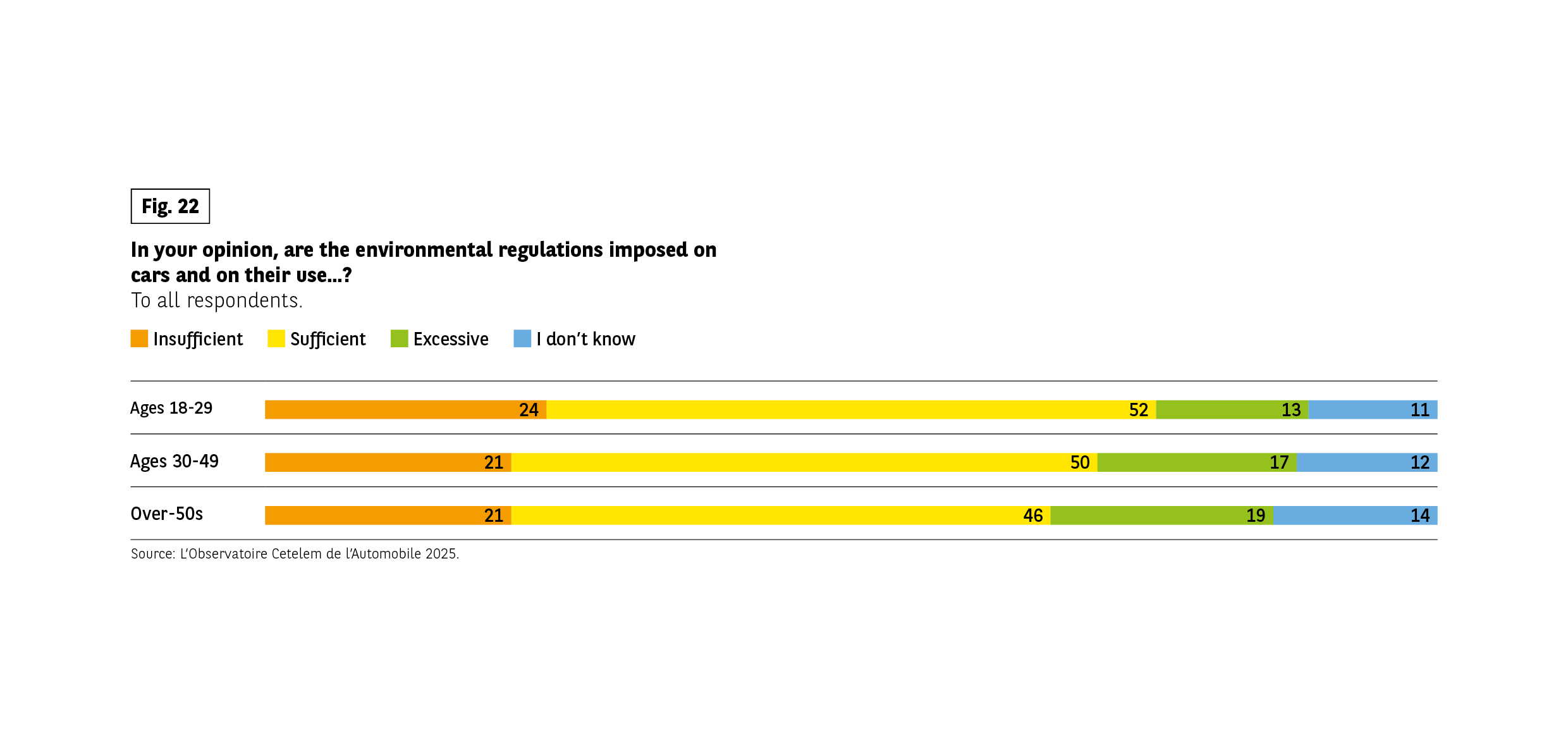Doubts over the green credentials of cars


It’s difficult to imagine what the world will look like in 30 years’ time. Difficult, but not impossible, or so young people tell us. According to them, cars will be as important, if not more important, than they are today. In their electric form, they are even seen as a symbol of progress through innovation.
CARS HAVE A GREAT DEAL TO ANSWER FOR WHEN IT COMES TO THE ENVIRONMENT…
Mentioning the environment inevitably leads us to place cars in the dock. So, guilty or not guilty?
On this point, young people are less forgiving than their elders. Almost half believe that they are the leading cause of global warming, a view shared by only 3 in 10 seniors. It should be stated that across all age groups, those who think that cars are the main cause of global warming are never in the majority.
This is a question that reveals major differences between China, Japan and Turkey, where cars are seen as the main culprit by around 60% of respondents, and every other country surveyed. City dwellers are also more likely to express this view.
Moreover, young people in urban areas are more vocal in singling out cars as the main source of pollution, although the gap here is less pronounced. Indeed, 64% are of this opinion, compared with just 58% of seniors.
What these results undoubtedly point to is the greater environmental awareness of young people, who tend to be better informed than their elders and feel very strongly that this is an issue that affects their future (Fig. 21).
Fig 21 – Perception of the car’s environmental impact
Download this infographic for your presentations The infographic presents the responses to the question: “Do you think the car is…?”, asked to all respondents. Two propositions are evaluated: “main source of climate change” and “main cause of urban pollution”. The results are compared for three age groups: 18-29 years old, 30-49 years old, and 50 years old and over.
The data displayed are:
18-29 years old: climate change 44%, urban pollution 64%
30-49 years old: climate change 38%, urban pollution 61%
50 years old and over: climate change 30%, urban pollution 58%
Overall, all three age groups associate the car more with urban pollution than with climate change, with a slightly decreasing intensity according to age. Younger people are also more likely to consider the car a significant source of climate change.
Source: Cetelem Automobile Observatory 2025
The infographic presents the responses to the question: “Do you think the car is…?”, asked to all respondents. Two propositions are evaluated: “main source of climate change” and “main cause of urban pollution”. The results are compared for three age groups: 18-29 years old, 30-49 years old, and 50 years old and over.
The data displayed are:
18-29 years old: climate change 44%, urban pollution 64%
30-49 years old: climate change 38%, urban pollution 61%
50 years old and over: climate change 30%, urban pollution 58%
Overall, all three age groups associate the car more with urban pollution than with climate change, with a slightly decreasing intensity according to age. Younger people are also more likely to consider the car a significant source of climate change.
Source: Cetelem Automobile Observatory 2025
AND THEIR PRESENCE IS NOT ALWAYS WELCOME
Differences of opinion between the generations are again evident when it comes to the question of banning the sale of combustion-powered cars. Once more, regardless of age, there is no majority in favour of such a policy. Only 39% of young people are opposed to it, compared with 46% of seniors. There are twice as many opponents in cities as there are in rural areas, and a similar proportion in most European countries.
Young people are also slightly stricter when it comes to the environmental regulations imposed on cars. However, only 24% believe them to be inadequate, with just 21% of seniors agreeing. 1 in 2 are of the view that current regulations are sufficient. As one might expect, criticism is more likely to be encountered in cities. Once again, the environmental “literacy” of young people, which is founded on higher-quality information, may account for this result (Fig. 22).
Fig 22 – Perception of environmental standards, by age
Download this infographic for your presentations The infographic presents the responses to the question: “In your opinion, the environmental standards imposed on the car and its use are…?”, asked to all respondents. Four judgments are proposed: “insufficient”, “sufficient”, “excessive”, and “don’t know”. The results are compared for three age groups: 18-29 years old, 30-49 years old, and 50 years old and over.
The data displayed are:
18-29 years old: insufficient 24%, sufficient 52%, excessive 13%, don’t know 11%
30-49 years old: insufficient 21%, sufficient 50%, excessive 17%, don’t know 12%
50 years old and over: insufficient 21%, sufficient 46%, excessive 19%, don’t know 14%
Overall, the majority of respondents in each age group consider the environmental standards sufficient, although this proportion decreases slightly with age. Perceptions of excess or insufficiency vary moderately between groups.
Source: Cetelem Automobile Observatory 2025
The infographic presents the responses to the question: “In your opinion, the environmental standards imposed on the car and its use are…?”, asked to all respondents. Four judgments are proposed: “insufficient”, “sufficient”, “excessive”, and “don’t know”. The results are compared for three age groups: 18-29 years old, 30-49 years old, and 50 years old and over.
The data displayed are:
18-29 years old: insufficient 24%, sufficient 52%, excessive 13%, don’t know 11%
30-49 years old: insufficient 21%, sufficient 50%, excessive 17%, don’t know 12%
50 years old and over: insufficient 21%, sufficient 46%, excessive 19%, don’t know 14%
Overall, the majority of respondents in each age group consider the environmental standards sufficient, although this proportion decreases slightly with age. Perceptions of excess or insufficiency vary moderately between groups.
Source: Cetelem Automobile Observatory 2025
